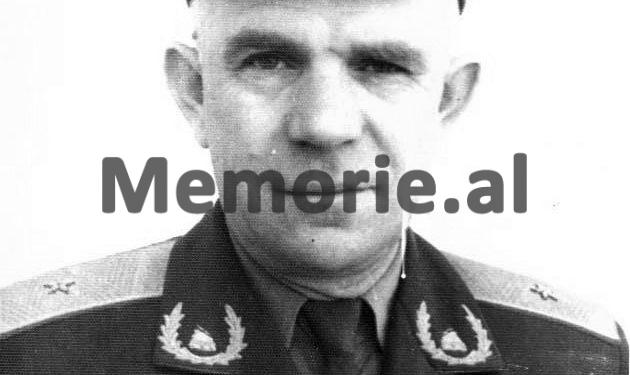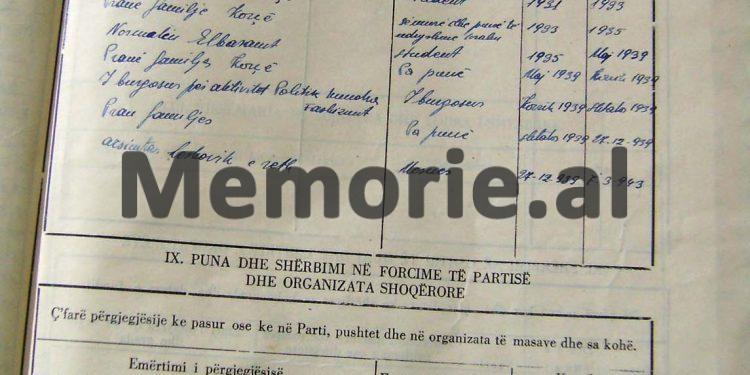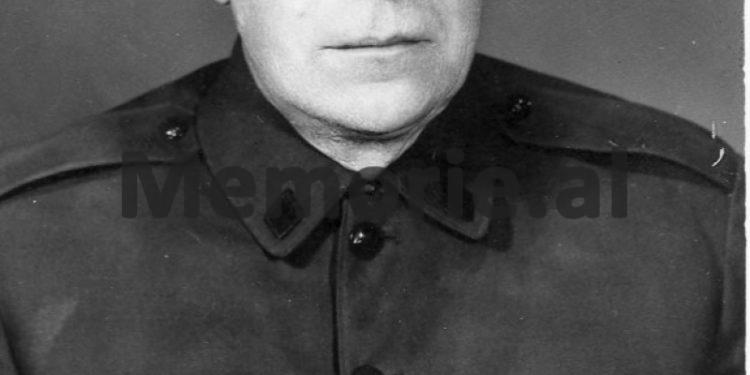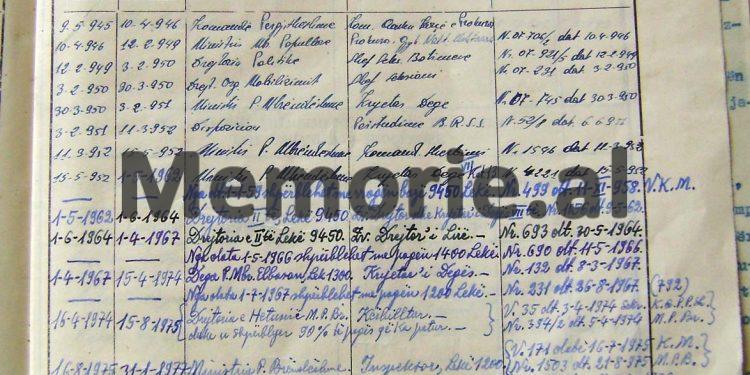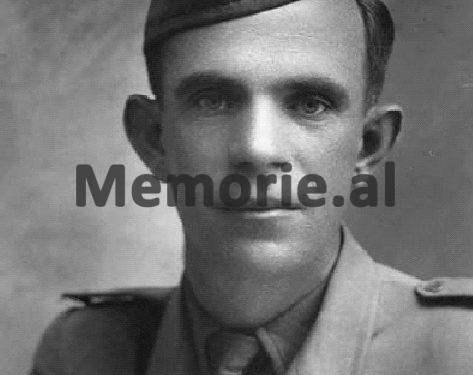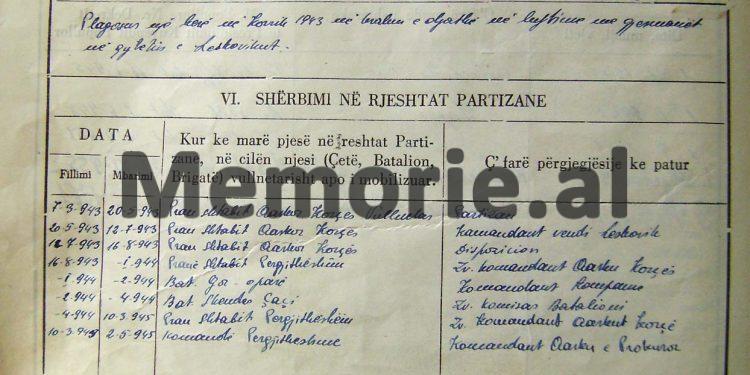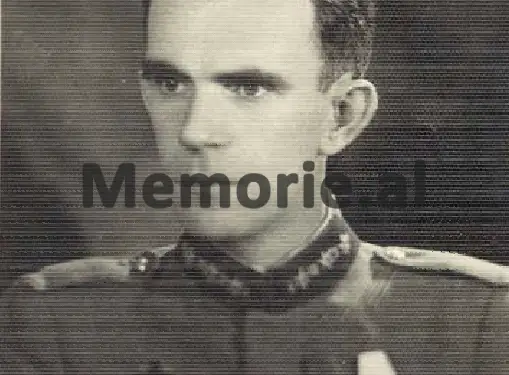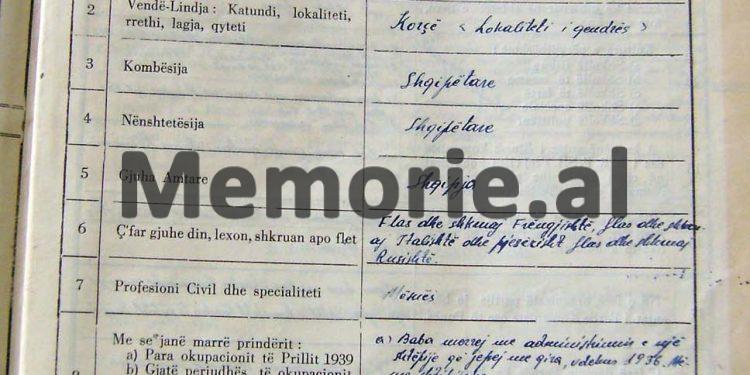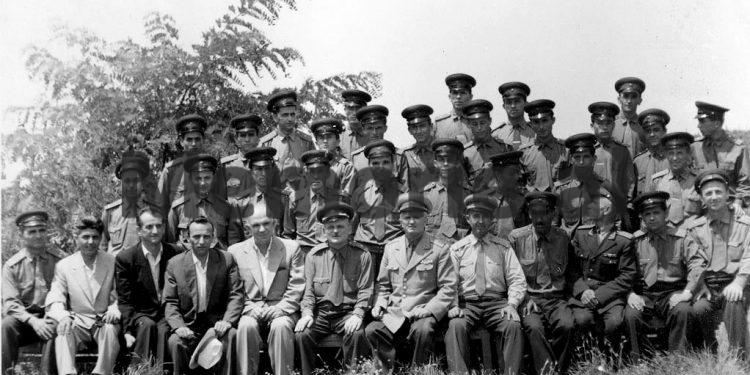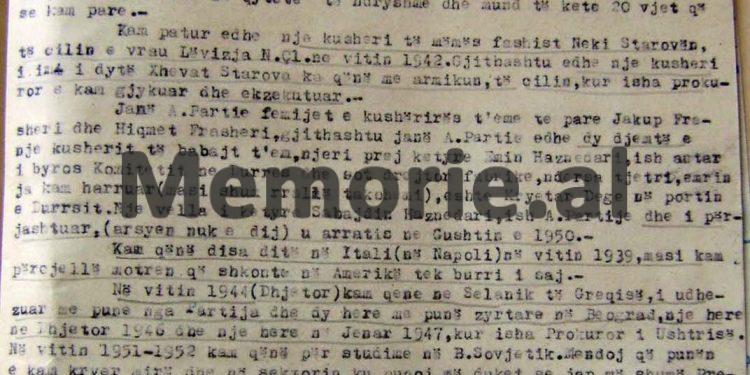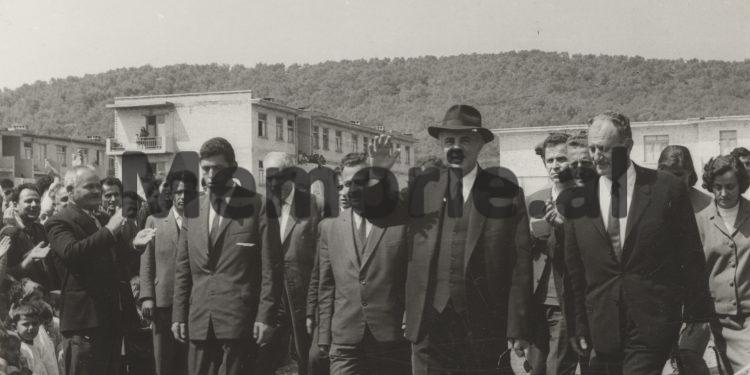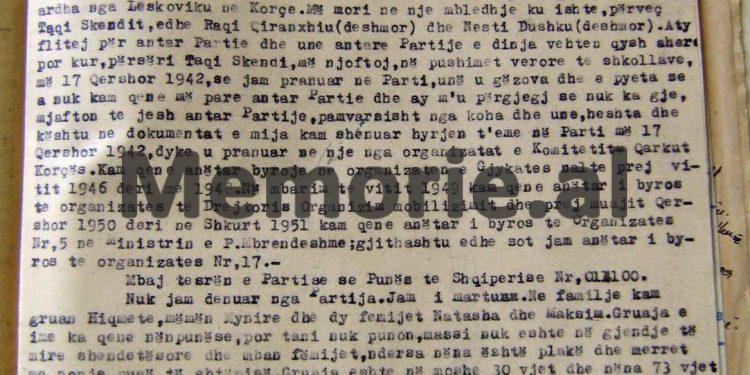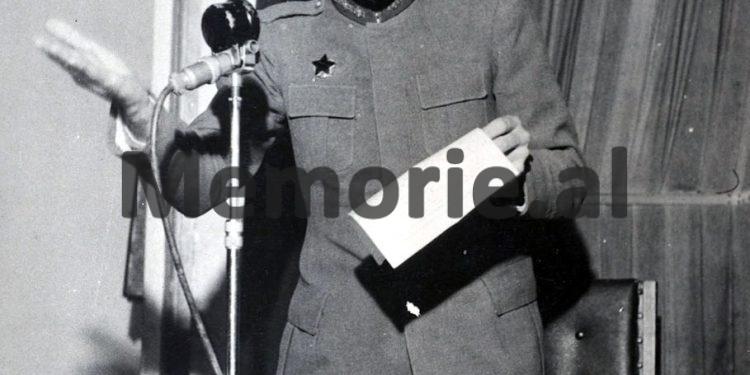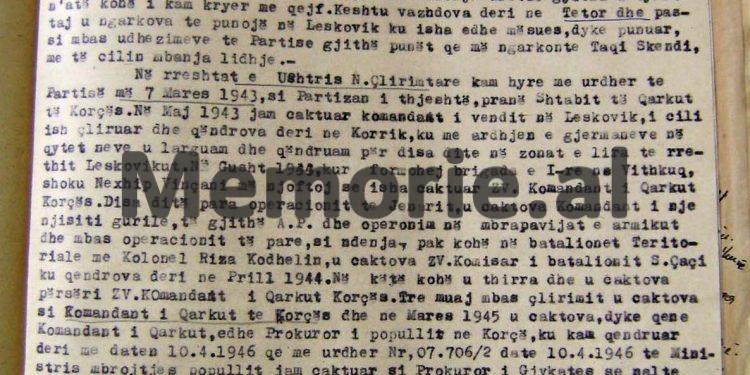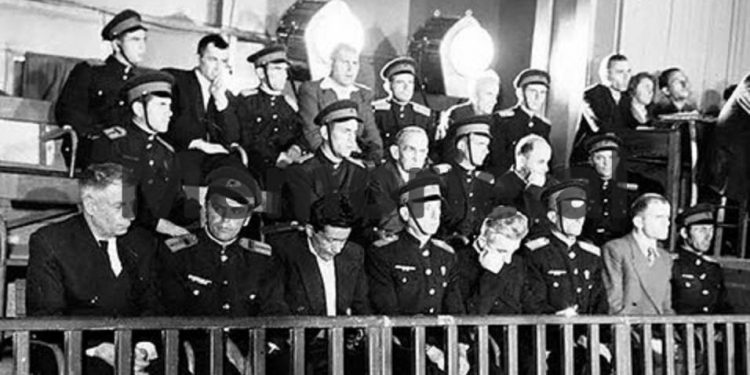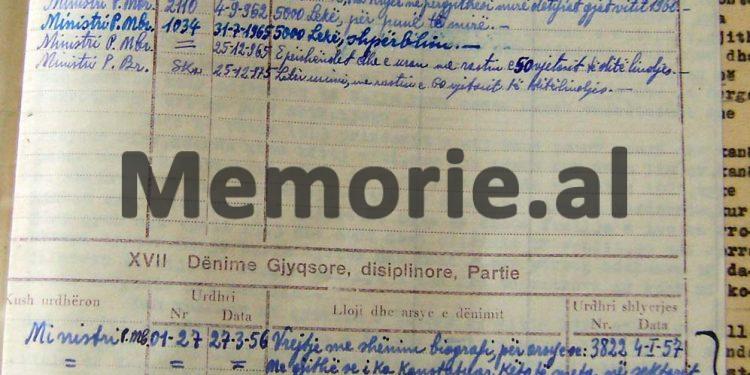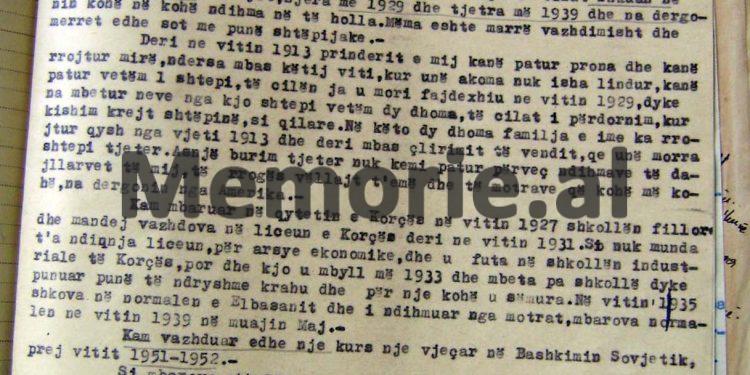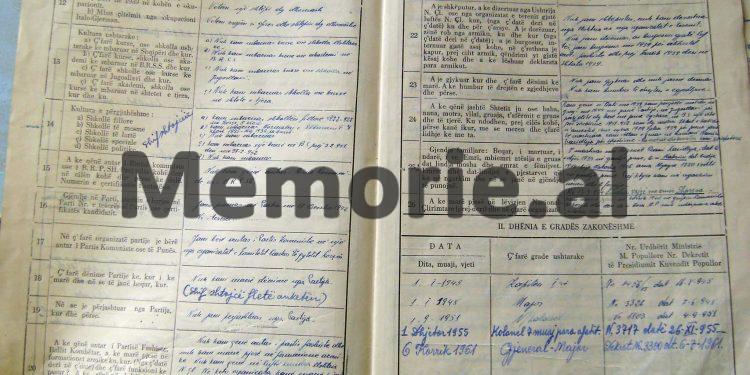Dashnor Kaloçi
Memorie.al publishes some unknown archival documents extracted from the Archive of the Ministry of Internal Affairs in Tirana, which contains the work file of Major General Nevzat Haznedari, former prosecutor, investigator, and chief investigator at the Ministry of Internal Affairs of Albania. from 1945 to 1979 when he was released. What is written in the “Officer’s Card” and the autobiography is written with his own hand by Haznedari, otherwise known as the “Black General”, due to the violence and brutality he exercised with the most horrific torture of his “clients” in the cells of the State Security, starting from 1945, when he was promoted to First Captain, as a reward for the kidnapping action in Greece and the behavior in Tirana, of the former Prime Minister of the Monarchy, Koço Kota ?! How Haznedari tried and sentenced them to imprisonment and death, some of his closest people, such as his first cousins, Xhevat Starova, Selami Baruti, etc., or his wife’s uncle. All the sensational investigative processes that Haznedari has led since 1960, starting with the “Cham Enemy Enemy Group of Counter-General Teme Sejko”, “The Coup Group in the Army of Beqir Balluku, Petrit Dumes and Hito Chako”, “The Sabotage Group in the Economy of Abdyl Këllezit, Koço Theodhosit, Kiço Ngjelës, Vasil Kati ”, etc., where he wrote with his own hand about the evaluations he received for“ good work ”, being honored with medals and decorations and high titles, as well as financial rewards for any investigative process, which was equal to the annual salary of a middle official in the communist regime!
“I have another sister, Nevrez Uzuni. Her husband in the late 1950s was described as a kulak, and later, as I am known, for not denouncing some tree roots, he was sent to prison for 6 years, and in an ongoing operation, in the hospital, he died. Sister, has two sons, both organized with youth. One work in Kuçova, and the other, a carpenter in Tirana. He lives with me along with his sister. And my tribe has been linked to the Communist Movement. I have two martyred cousins, Hasan Dishnica, and Servet Agolli, and another first cousin, as martyrs of L.A.N.Ç. I have sentenced another cousin, Selami Baruti, to 10 years, a former gendarmerie captain. I have not had any acquaintance with this, as he has lived for 10 years as a gendarme in various places, and I may have been there for 20 years since I saw him. I also had a cousin of the fascist mother, Neki Starova, who was executed by the N.ÇL Movement. in 1942. I also had a cousin of the fascist mother, Neki Starova, who was executed by the N.ÇL Movement. in 1942. Also, a second cousin of mine, Xhevat Starova, was with the enemy, whom when I was Prosecutor, I tried and executed ”.
He writes, among other things, in his autobiography (which is attached to the officer’s card file), Major General Nevzat Haznedari, a former military prosecutor and chief investigator of the Ministry of Internal Affairs, who since January 1945 when he was promoted to First Captain, as a reward for the abduction of former Prime Minister Koço Kota in Thessaloniki, Greece, until the end of his career as a senior military officer at the “Dictatorship of the Proletariat” in Tirana in 1979. , shortly after investigating the “hostile group in the economy” (led by two members of the Politburo and Deputy Prime Ministers Abdyl Këllezi and Koço Theodhosi who were sentenced to death and executed), is known as one of the most violent investigators and the horror of political prisoners in the communist regime of Enver Hoxha. In addition to his first action (the kidnapping in Greece of former Prime Minister Koço Kota), which was the “test of fire” before the Party, which marked the beginning of a “brilliant” career in the ranks of the organs of The Ministry of Internal Affairs, as well as the investigative process against General Haznedar’s “hostile group in the economy”, the “work file” as an investigator and chief investigator, is full of a number of other most sensational processes in the history of the communist regime. Enver Hoxha. Such as: “The Process of the Anti-Admiral of the Navy, Teme Sejko”, “The Process of the Coup Group in the Army led by Beqir Balluku”, etc., where all hold the “seal” of his hand. And for all this, as we will see in the “Officer’s Card”, where attached is his autobiography, Major General, Nevzat Haznedari, not only has been praised for good work with moral incentives, such as honorary leaflets, medals and high decorations, but he was also materially rewarded with very large financials after each investigative process in which he participated, which exceeded the average annual salary of an ordinary employee in the communist regime before the 1990s. All this is written with his own hand in the “Officer’s Card” that he has filled in with his own hand, as well as in the personal autobiography that is attached to that document, which was the “norm” for any military cadre and party member, who was obliged to answer the questionnaire of that form with the greatest rigor, noting there everything he had done since the day he was born, as well as the biographies of his family circle, starting from his wife, children, etc., to his distant cousins, friends, colleagues, friends, and associates. Likewise, the military cadre and the member of the party, there in that file had to declare all his activity from the day he was born, as well as: education, specializations, evaluations, rewards, promotions, criticisms, remarks, punishments, posts and the functions and duties he had performed and held, etc. etc., by “not hiding anything from the Party”. All this “work practice” was borrowed from Lenin and Stalin’s Bolshevik Communist Party, which Enver Hoxha took as an example and implemented point by point throughout his activity, from November 8, ’41 when came to the helm of the Albanian Communist Party, and died in April ’85. For more than what the “Officer’s Card” contained (with the relevant autobiography), we know this archival document that belongs to the work file of Major General Nevzat Haznedari, which Memorie.al publishes in full and for the first time, as it is in the relevant file in the Archive of the Ministry of Internal Affairs in Tirana.
The work file of Major General Nevzat Haznedari, 1944 -1979
OFFICIAL PERSONAL CARD
Name: Nevzat
Father: Ahmet
Surname: Haznedari
PERSONAL DATA
Date of birth, day, month, year: 25.XII.1915
Place of birth, Katundi, locality, district, neighborhood, city: Korça, locality of the center.
Nationality: Albanian
Citizenship: Albanian
Mother Tongue: Albanian
What language do you know, read, and speak: I speak and write French, speak and write Italian, and partly speak and write Russian.
Civil profession and specialty: Teacher
What the Parents Did: Before the April 1939 Occupation, During the Occupation Period from 1939 to November 1944, After the Italo-German Occupation: The father was engaged in the administration of a rented house, and died in 1936, while his mother is a housewife.
Have they lost the right to choose from the trials, or which of your relatives (Father, mother, sister, brother, wife, and relatives, when and why, when did he complete it, or when did he complete the sentence) if they have won the rights, when they have won: No one has lost the right to choose from the courts.
Have they been or are some of the relatives of your tribe in the Albanian Labor Party, or in other parties, if they have been excluded when and why: In the Labor Party I have a brother-in-law, Namik Kacidha, and two sons of the first cousin.
Social origin: I am of feudal origin.
The economic situation of the family, until 1939 at the time of the occupation, after the Italo-German occupation: Only a two-room house and the salary as an officer.
Military culture: What courses or military schools did you finish in Albania and when? What military courses or schools did you complete in the USSR and when? What courses or military schools did you take in Yugoslavia and when? What military courses or schools have you completed in other countries, and when: I have not completed military courses or schools, I have not completed military courses or academies in the USSR, I have not completed military courses or academies in Yugoslavia, I have not completed military courses or academies in other states.
General culture: Primary school, high school, high school, special school, political school: I finished primary school in 1922-1927 in Korça, 5th grade, without the scholarship, I graduated from Elbasan Normal, in 1935-1939 , 5th grade, I completed a course in the Soviet Union on 3.2.1951 to 27.2.1952.
Were you a member of the Communist Youth, or of the B.R.P.SH. from what time, to what time you came out. Nr. of the membership certificate: I was not a member of the communist youth, nor of the B.R.P.SH.
The situation in the Party, an internship in the Party, no. of the Party card, or of the candidate’s certificate: I was admitted to the Party on 17 June 1942, no. of the card …………
In which party organization have you become a member of the Communist Party, or of the Labor Party: I have become a member of the Communist Party in one of the organizations of the Central Committee of Korça.
What punishments do you have for the Party, when did you receive them, and if they were removed from you, when: I did not receive any punishment from the Party. (See appendix sheet)
If you have been expelled from the Party, when and why: I have not been expelled from the Party.
Were you a member of the Fascist Party, the National Front, did you take part in enemy formations, where and when, (From what date to what date,) and what function did you have? Have you been in the war against the National Liberation Army, and which of your relatives, or your wife, have participated in these organizations: I have not been a member of the Fascist Party, and I have not participated in combat formations. I did not take part in the war against the National Liberation Army. My first cousin, Selami Baruti, and a maternal cousin, Neki Starova, participated in these organizations as a fascist killed as an enemy of the National Liberation Army in 1942 in Pogradec.
If you have been a member of other organizations, when and why did you come out: I have not been a member of other organizations.
Have you been judged when and what punishment you received? Have you lost the right to vote and why: I have not been tried and I have not been convicted. I have not lost the right to vote.
Have you been abroad, you, or your father, mother, sister, brother, wife, and relatives, or others? Where they are, from what time, why they left, how they deal with them, and you have a connection with them: I was in Italy in 1939, because I followed my sister, to Greece, I was in 1944 for party work, in Yugoslavia, I have have been twice for official work, in the Soviet Union, I have been once for studies in the years 1951-1952, I have two sisters in America, one fled in 1929, while the other is 1939, both married there. I have a brother-in-law in Romania, Namik Kacidhja.
Marital status, single, married, divorced, widowed. Name, surname, father’s name, date of birth, age, and children’s names. Names and dates of birth of the members in charge, and if they are able to work: Married to Hiqmete Rami Kacidhja, born in 1923, in working condition. The son, Maksim, born in 1948, the daughter, Natasha, born in 1946, and the mother, Myzireja, born in 1880, is unable to work. I am in charge, mother, and two children. On 13.5.1954. a girl named Shpresa is born.
Have you participated in the National Liberation Movement (from and to) and in what organization: I participated in the movement, in 1943, with the Communist Group of Korça, and until I became A.P. I did not stop my activity.
DATA OF COMMON GRADE
Day, month, year: 1.1.1945. 01/01/1948. 01/09/1951. 01/12/1955. 06/07/1961.
What military rank: Captain I, Major, Vice-Colonel, Colonel, 7 months before the term, Major-General. Nr. Order of the Ministry of Public Affairs. Nr. of the Decree of the Presidium of the People’s Assembly: No. 1456 ft. 01/16/1945. Nr. 3326 ft. 06/07/1948. Nr. 3717 ft. 11/26/1955. Nr. 3380 ft. 06/07/1961.
Where, when, and how many times have you been wounded or contracted, with which ward in combat and operations: I was wounded once in combat in 1943, on the right-wing, in combat with the Germans in the town of Leskovik.
SERVICE IN PARTIZAN ROOTS
Date, start end. When you have participated in partisan ranks, and in which unit (Squad, Battalion, Brigade) voluntarily or mobilized. What responsibilities did you have: 7.3.1943 – 20.5.1943, at the Korça District Headquarters, volunteer, 10.5.1943 – 12.7.1943, at the Korça District Headquarters, Deputy Commander in Leskovik, 12.7.1943 – 16.8.1943, at the Headquarters of Korça Region, available, 16.8.1943 – 1.1.1944, at the General Staff, as Deputy Commander of Korça Region, 1.1.1944 – 2.2.1944, in the Battalion of Gora-Opar, as Company Commander, 2.2. 1944 – 4.4.1944, in the Battalion “Skënder Çaçi”, as Deputy Commander Battalion, 4.4.1944 – 10.3.1945, at the General Staff, as Deputy Commander of the Korça Region, 10.3.1945 – 2.5.1945, in Commander-in-Chief, as District Commander, and Prosecutor.
WORK AND RESPONSIBILITY THAT HAPPENED IN ENTE, DIKASTERE, FABRIKA, CIVIL UZINA, WHICH IN THE BEGINNING OF YOUR WORK
What departments, enterprises, families, or your economy, have you worked for a salary, how long, and what responsibilities and specialties have you had. Appointment of departments and school enterprises, responsibility, as well as the start and end date: In the city of Korça, students, in the years 1922 – 1927, in the Lyceum of Korça, student, in the years 1927 – 1931, in the Industrial School of Korça, student, in the years 1931 – 1933, near the family in Korça, I did different jobs, in the years 1933 – 1935, in the Normal of Elbasan, student, in the years 1935 – 1939, near the family in Korça, without work, in May 1939 – July 1939, imprisoned for political activity against fascism, in July 1939 – September 1939, as a teacher in Leskovik and in the districts, teacher, on 27.12.1939 – 1.3.1943.
WORK AND SERVICE IN PARTY FORCES AND SOCIAL ORGANIZATION
What responsibilities have you had in the Party, the Powers, in the Mass Organizations, and for how long? The naming of Responsibility, naming of the organization, time of beginning and end: Member of the Bureau, in the Organization of the Supreme Military Court, May 1946 – October 1948, Member of the Bureau, in the Mobilization Organization, January 1950 – February 1950, Member of the Bureau, in the Organization Nr. 5, February 1950 – September 1951.
SERVICE SERVICE
In what units, and units of the people’s army, have you served, what responsibility have you had, and for how long. Nr. of orders on transfer or assignment. Date of start and end, naming of military units and units, the responsibility you had, no. and the date of the order: 9.5.1945 – 10.4.1946, in the General Command, as District Commander and Prosecutor, 10.4.1946 – 12.2.1949, in the Ministry of People’s Defense, as Prosecutor of the High Military Court, no. 07.706 / 2 10.4.1946 – 12.2.1949 – 3.2.1950, in the Political Directorate, as head of the Publications Branch, No. 07.921 / 5, 3.2.1950 – 20.3.1950, in the Directorate of Organization and Mobilization, as head of a section, Nr. 07.231 30.3.1950 – 3.2.1951, in the Ministry of Internal Affairs, as Branch President, No. 07.745. 3.2.1951 -11.3.1952, available for studies in the USSR, Nr. 52/8. 11.3.1951 – 15.5.1952, in the Ministry of Internal Affairs, as Service Commander, no. 1596. 15.5.1952 – 1.5.1962, in the Ministry of Internal Affairs, as Chairman of Branch VII (Investigation), no. 4221. From 1.1.1959, he is rewarded with the basic salary of 9500 ALL, no. 499. 1.5.1962 – 1.6.1964. Second Directorate, ALL 9500, as Deputy Director and Chairman of Branch VII, no. 1056. 1.6.1964 – 1.4.1967. Second Directorate, ALL 9500, as Deputy Director / Director, no. 693. On 1.5.1966, he is rewarded with 1400 ALL, No. 690. 1.4.1967 – 15.4.1974, Branch of Internal Affairs, in Elbasan, as Branch President, Nr. 132. On 1.6.1967, it is rewarded with 1200 ALL, No. 231. 16.4.1974 – 15.8.1975, in the Directorate of Investigation of the Ministry of Interior, as an Adviser, Decision no. 35. Rewarded with 90 percent of the salary. 16.8.1975 – 31.1.1977, in the Ministry of Internal Affairs, as Chief Inspector, with a salary of 1200 ALL, Decision no. 171. On 1.4.1976, he was rewarded with a salary of 1000 ALL, Decision no. 1503. 1.2.1977 – 15.1.1979, in the First Directorate, as Chairman of the Special Branch, Decisions no. 36. and 84/2. 01/15/1979. is issued in reserve, due to retirement, Decisions no. 342. and 1629/2.
MOVEMENTS AND REVIEWS
Whoever orders, the order with no. and date the reason for praise and reward: Minister, 9733, 27.12.1952. 4000 lekë for work merit, minister, 444, 27.1.1954. 4000 lekë for work merit, minister, 3280, 23.1.1957. 5000 lekë for good results in his work sector, minister, 2691, 10.11.1958, 7000 lekë for economic aid, minister, 166, 30.1.1959. 200 marks are sent to him, to buy herbs, after he was hospitalized as a patient, in the German Democratic Republic, General Ziçishti, there is no order, 25.12.1958. Praised for his merits during 1958, Minister, 3505, 19.12.1959. 5000 lekë for good results at work, Deputy Minister Ziçishti, 15.11.1960, has generally performed well, tasks during 1960, minister, 2110, 4.9.1962. 5000 lekë for good work, minister, 1034, 31.7.1965. 5000 lekë reward, the minister, 25.12.1965, greets and congratulates him on the occasion of his 50th birthday, the minister, 25.12.1975, congratulatory letter on the occasion of his 60th birthday.
JUDICIAL, DISCIPLINARY, AND PARTIAL DATA
Whoever orders, the order with no. and date, type, and reasons for the sentence, payment order no. and date: Minister, 01 – 27. 27.3.1956, remarks with a note in the biography for the following reasons: although he found these shortcomings, in the operational sector, he did not make issues of the leadership of the ministry, did not take all measures to use the materials available to the investigator, and their investigator has gone very slowly (in relation to people coming from abroad) the minister, 935. 26.6.1963, the deadline for decoration is postponed by order of class II, with a year, 4025. 17 – 65. Deputy Minister Shehu, 2662. 3.6.1971, addressed to the First Directorate, remarks on the management and flexible management of his subordinates, on the strengthening of control over the supervision of problems, with a sharp hostile character, (regarding the pursuit of a processing facility in Elbasan, to Greece).
Autobiography
Colonel Nevzat Haznedari, son of Ahmeti, and Munire, born on 25.12.1915 in Korça, and resident in that city. Both father and grandfather were born and raised in that city. Since 1946, transferred by service, I live with my family in Tirana. I am of Albanian nationality and citizenship, and I have Albanian as my mother tongue. He comes from a feudal origin because my grandfather had a feudal lord in Greece, and another in a village in Korça. My father also had this property until 1913, when at that time, with the establishment of the Greek-Albanian border, the wealth of Greece remained beyond the border, while he sold his wealth in Albania, leaving only a large house in Korça… In this house, we partially lived on our own, while we rented out the rest. My father never worked, he lived only on the income of the goods he had, while at this time, he was helped by his mother’s brothers (his brothers-in-law) and with the rent of the house. Also after 1922, my brother started working and helping the house and from 1929, we were helped by my sisters. They went to America with their husbands, one in 1929, and the other in 1939. They were sending us cash at the time. Mom is constantly busy and still does, with housework. Until 1913 my parents owned property, and they lived well, and after this year, when I had not yet been born, they were left with 1 house which the usurer took from them in 1929, leaving us with only this house. two rooms, which we used when we had the whole house as cellars. In these two rooms, my family has lived since 1913, and until after the liberation of the country, I took another house. We had no other source but the help of my uncles, my brother’s salary, and the sisters who sent us from America. I finished primary school in the city of Korça in 1927, and then I continued the High School of Korça until 1931. As I could not attend high school, for economic reasons, I entered the Industrial School of Korça, but even this was closed in 1933. I was left without a school and took up various jobs, and for a time became ill. In 1935, I went to the Elbasan Normal, and with the help of my sisters, I finished it in 1939, in May. I continued a one-year course in the Soviet Union from 1951 to 1952. After graduating from high school, I stayed for several months without being named a teacher, like my friends, after being imprisoned as an anti-fascist in July 1939, until September 1939, and I was not appointed a teacher until I came to Tirana myself. With the mediation of Ahmet Duhanxhiu, my former professor in Elbasan, and then head of the primary schools in the Ministry of Education, I was appointed a teacher, where I stayed until the end of 1942. My social circle in the past since the time of Zog, and until LANÇ started., there were all the friends of the neighborhood with whom I had grown up since childhood, and with whom I had studied in schools, such as Sami and Nazmi Tyxhari, (brothers) both connected with the Movement since beginning. But when the Movement began to expand, the first went to Italy, where he was a student, and today he is there, while the second broke away from the Movement and remained indifferent, until, in August 1944, summoned by me, he came as a teacher and stayed in the free areas, as it is today. Their family today, for the fact that they have been affected by the reform, must stay well. I also had a close friend at the Elbasan Normal, a Telemak Kona, from Berat. With this, I lived in a room, but even today he is in Italy, where he went to study. I have not met with them or corresponded since 1941. I have had a close friend in the past, and I have, Nuri Resnja (party member). I have not been to enemy organizations and formations. In the National Liberation Movement, I was connected from the very beginning and I remember that in July 1941, he spoke to me, recognizing me as an anti-fascist, after we always talked about the fascist captivity that had plagued us. Comrade Nuri Resnja, and later Comrade Taqi Skëndi, spoke to me about the Communist Group of Korça, and about the tasks that came before the communists to carry them out. I was happy and agreed to do everything, so Comrade Taqi Skëndi, Nuri Resnja, Sami Tyxhari, and I formed a group led by Taqi Skëndi. We held regular meetings, distributed leaflets, and carried out propaganda and warfare against the young people of Anastas Lulo, many of whom lived in the neighborhood where I lived. I performed all the tasks at that time with pleasure. So I continued until October, and then I was assigned to work in Leskovik, where I was a teacher. Working according to the party’s instructions, all the work was entrusted to me by Taqi Skëndi, with whom I also kept in touch. I joined the ranks of the National Liberation Army by order of the Party on March 7, 1943, as a simple partisan of the Korça District Headquarters. In May 1943, I was appointed as a commander of the country in Leskovik, who had been liberated. With the arrival of the Germans, we left and stayed for a few days in the free areas of Leskovik. In August 1943, when the First Brigade was being formed in Vithkuq, Comrade Nexhip Vinçani informed me that I had been appointed Deputy Commander of the Korça Region. A few days before the January operation, I was appointed commander of a guerrilla unit, all A.P. and we operated on the enemy’s rear. After the first operation, as I stayed for a while in the territorial battalions with Colonel Riza Kodheli, I was appointed Deputy Commissioner of the “Skënder Çaçi” Battalion, where I stayed until April 1944. At that time I was called and I was again appointed Deputy Commander of Korça District and in March 1945, I was appointed Commander of the District and People’s Prosecutor in Korça, where I stayed until April 4, 1946. By order No. 07.706 / 2 dated 10.4.1946, of the Ministry of People’s Defense, I was appointed as a Prosecutor in the High Military Court, and I came to Tirana. As a Prosecutor of the High Court, I stayed until February 1949 and I was transferred by order No. 07.921 / 5 dated 12.2.1949, of the Ministry of People’s Defense, to the Political Directorate, as head of the publications section and then I was transferred to the Directorate of Organization. – Mobilization by order no. 07.231, dated 3.2.1950. As chairman of the Mobilization Branch, I stayed until 30.3.1950, when I came to the Ministry of Internal Affairs, with the order 07.745. dated 30.3.1950, as chairman of the Branch. From 3.2.1951, until 11.3.1952, I remained at the disposal of the staff with order 32 (8) dated 6.6.1953, conducting studies in the Soviet Union, and with service command dated 1.4.1952. I have been appointed Branch President. I took part in many fights carried out by the units of the Korça District Headquarters, the “Skënder Çaçi” battalion, and the guerrilla units that I commanded, against the Italian-Germans and the traitors of the country. I have not been detached, nor have I been taken prisoner, being in the ranks of the National Liberation Movement. The first rank, I received on January 1, 1945, as the First Captain, by order no. 1456-13, dated 16.8.1945. Major, I was promoted on January 1, 1948, by order 3326, dated 7.6.1948, and Under – Colonel I was promoted on 1.9.1951, by order 1803, dated 4.9.1951. I took the military oath in 1946 at the Officers’ House. I remember that in July 1941, Comrade Nuri Resnja, and later Comrade Taqi Skëndi, spoke to me about the Communist Group of Korça. In December 1941, or January 1942, I was called by Taqi Skëndi and came from Leskovik to Korça. He took me to a meeting where comrades Raqi Qirinxhi (martyr) and Nesti Dushku (martyr) were present. There they informed me that I had become a Party member. But in my documents, I noted that I became a party member on June 17, 1942, after school holidays. I was a member of the Bureau of the Organization of the High Court from 1945 to 1948. Then I was a member of the Bureau in the Ministry of Interior, and today I am a member of the Bureau in Organization No. 17. I have not been convicted by the Party. I am married and have a wife, Hiqmeten, my mother Mynyren, and two children, Natasha and Maxim. My wife used to be a clerk, but now she can’t work. She carries the children while the elderly mother does some housework. The wife is 30 years old and the mother is 73 years old, and I am in charge of everything. The woman is the daughter of Qani Kacidha from Korça, and Lytfije Hasanaj, also from Korça. She has two brothers, Namik Kacidhja, 29, who studied abroad, and today is a railway engineer, and Drin Kacidhja, a former party member and now suspended (I don’t know why), 26, and head of the ministry’s department. of Industry. He also has a sister, Violeta, 19, a student and organized with the Youth Union. The woman’s family has been linked to the Movement and have a martyred son, Selaudin Kacidhja, killed by the Ballists in 1944. The woman’s mother has a brother in prison, whom I have tried as a Prosecutor, for 10 years as an enemy. My family has also been affiliated with the National Liberation Movement. I have a separated brother, who lives with his family in Korça, and who works in the city’s finances. I also have two sisters, Iqbal and Jaco, who have been married in America for years. The first fled to America in 1929 with her husband, and came only once in 1933, while the second fled in 1939, and did not come at all. Very rarely did I receive any letters from them, and I sent them by mail, and since 1948, I have not received any letters. I learned that their husbands work, manual labor. I have another sister, Nevrez Uzuni. Her husband in the late 1950s was described as a kulak, and later, as I am known, for not denouncing some tree roots, he was sent to prison for 6 years, and in an ongoing operation, in the hospital, he died. Sister, has two sons, both organized with youth. One work in Kuçova, and the other, a carpenter in Tirana. He lives with me along with his sister. And my tribe has been linked to the Communist Movement. I have two martyred cousins, Hasan Dishnica, and Servet Agolli, and another first cousin, as martyrs of L.A.N.Ç. I have sentenced another cousin, Selami Baruti, to 10 years, a former gendarmerie captain. I have not had any acquaintance with this, as he has lived for 10 years as a gendarme in various places, and I may have been there for 20 years since I saw him. I also had a cousin of the fascist mother, Neki Starova, who was executed by the N.ÇL Movement. in 1942. Also, a second cousin of mine, Xhevat Starova, was with the enemy, whom when I was Prosecutor, I tried and executed. They are party members, the children of my first cousin, Jakup and Hiqmet Frashëri. Also, members of the party are the children of the father’s first cousin, Emin Haznedari, a former member of the Bureau of the Party Committee in Durres. While the other (I forgot his name, as we rarely meet) is the head of the branch in the Port of Durres. One of their brothers, Sabaudin Haznedari, (excluded from the Party, I do not know the reason) fled the country in 1950. I was in Italy (Naples) for a few days, in 1939, after escorting my sister to America with her husband. Hers. In 1944 (December) I was in Thessaloniki, Greece, guided by party work, and twice by official work in Belgrade. Once in December 1946, and the next time in January 1947, when I was Army Prosecutor. In 1951-1952, I studied in the Soviet Union. I think I did a good job and I think I give a lot in the sector where I work. I claim the Order of the Flag, which I requested with proper documents, and I was given the answer that I submitted the documents out of time. But this is not my fault, as I have been with studies at B.R.S.S., and have not been informed. I claim this because some of my friends, who have done nothing more than me, have taken this order. I keep the commemorative medal No.293 dated 14.11.1945, the medal of liberation, No.3960 dated 21.6.1946, the medal of bravery, No.290 dated April 7, 1947, the order Ylli Partizan of class III, No.128 dated 8.5. 1951, and the order of military service No. 141 dated 30.7.1951. I have been rewarded with salaries by the leadership and the department. I am in good health and have never been to hospitals or resorts.
Tirana on 20.5.1953
N/Colonel Nevzat Haznedari
Memorie.al




